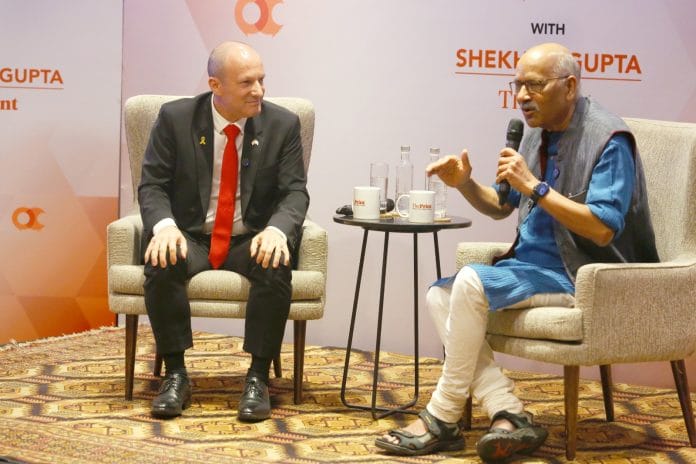Gurugram: Two countries are involved in the global proliferation of weapons of mass destruction—Pakistan and North Korea—said Reuven Azar, Israel’s ambassador to India at ThePrint’s Off the Cuff Monday. Azar added that Iran, which had openly promised to transfer such weapons to non-state actors, led to Israel’s military strikes against Tehran’s nuclear programme.
“Look, you were asking before about what if Iran becomes nuclear. Most of the nuclear countries I know are not proliferating weapons of mass destruction. I know two of them that have been doing that. One of them is North Korea. The second is Pakistan, right? What if you had a country that actually already was planning to transfer a nuclear bomb to the Houthis?” Azar said, while in conversation with Shekhar Gupta, ThePrint’s Editor-in-Chief, at the Quorum, Gurugram.
The Israeli ambassador added: “This is intelligence that our prime minister exposed only last week. They were planning to transfer a nuclear bomb to the Houthis. Can you imagine that? Yeah, because they are non-state actors. They are non-state actors with more than half a state with them. So this is complicated.”
Azar pointed out that Iran, while a member of the Non-Proliferation Treaty (NPT), was seeking to build a bomb, with the goal of “exterminating” Israel in 2027, through the use of “missile barrages” and a ground invasion from the “North and the South”. However, the Israeli ambassador claimed that Hamas launched its attacks on Israel on 7 October 2023, foiling Tehran’s plan.
“What is interesting to see is that Hamas actually foiled the Iranian plan. And there was a document published about two weeks ago that our intelligence caught from Hamas archives, which showed the leader of Hamas was apologising to [Hassan] Nasrallah, the leader of Hezbollah, for attacking Israel without coordinating [with] it. This was on the 7th of October,” said Azar.
The strategic situation in West Asia
Hamas’ attacks had a cascading effect on Iran’s security calculus. Tehran, which had painstakingly built a number of proxy forces to surround Israel, was on the back foot, especially following the degrading of Hezbollah’s capabilities in Lebanon, by Israel. This led to a perception of “vulnerability” within Iran, that led it to enrich uranium at very high rates, as it sought to go nuclear with its ballistic missiles, the Israeli ambassador explained in building the context to Tel Aviv’s strategy in the past weeks.
In the early hours of 13 June, the Israeli military launched Operation Rising Lion—military strikes targeting Iran’s nuclear facilities and key personnel. Within the first few days, a number of senior Iranian military officials and nuclear scientists were killed. Roughly a week later, the US joined Tel Aviv, with its own Operation Midnight Hammer, that struck three Iranian nuclear facilities—Fordow, Natanz and Isfahan.
US President Donald J. Trump has asserted that the American strikes have “completely obliterated” Iran’s nuclear ambitions. Azar made it clear that Israel’s operation had the blessings of the American administration from the beginning.
“The Americans told us, okay, give us 60 days, we’ll try to negotiate with the Iranians. But if they don’t comply with our demands, go ahead. Not only that, they planned this with us. So on day 61, we attacked. We dealt with two threats that were threats to eliminate our country, to annihilate us. One was the nuclear military threat, and the second, the ballistic missile threat,” Azar said.
At the time, Iran was negotiating a deal with the US for its nuclear programme, with the fifth round of talks set to be held on 15 June in Oman. However, following the strikes, Iran pulled out of the deal. The conflict ended after 12 days, with both Tel Aviv and Tehran agreeing to a ceasefire.
Israel’s Prime Minister Benjamin Netanyahu had in an address to the Iranians, called for its people to rise up against the current administration. However, Azar clarified that “regime change” was never a part of Tel Aviv’s strategy during Operation Rising Lion.
“Nobody was planning to invade Iran or to take care of a nation of 100 million people. And therefore, as a democracy (Israel), which, you know, is accountable to its people, which actually has a conscription army, we are not in the business of, you know, dragging our people to endless wars to change the political landscape in other countries,” said Azar.
The Israeli ambassador added: “We are not capable of doing it. We don’t have the will, okay? So we concentrated on these two goals (ending the nuclear programme and ballistic threat). And of course, you know, I would be very happy if there would be a regime change in Iran, but it depends on the Iranian people.”
(Edited by Viny Mishra)
Also read: Has Tel Aviv sought US aid to strike Iran’s nuclear mountain? What Israeli envoy to India had to say






